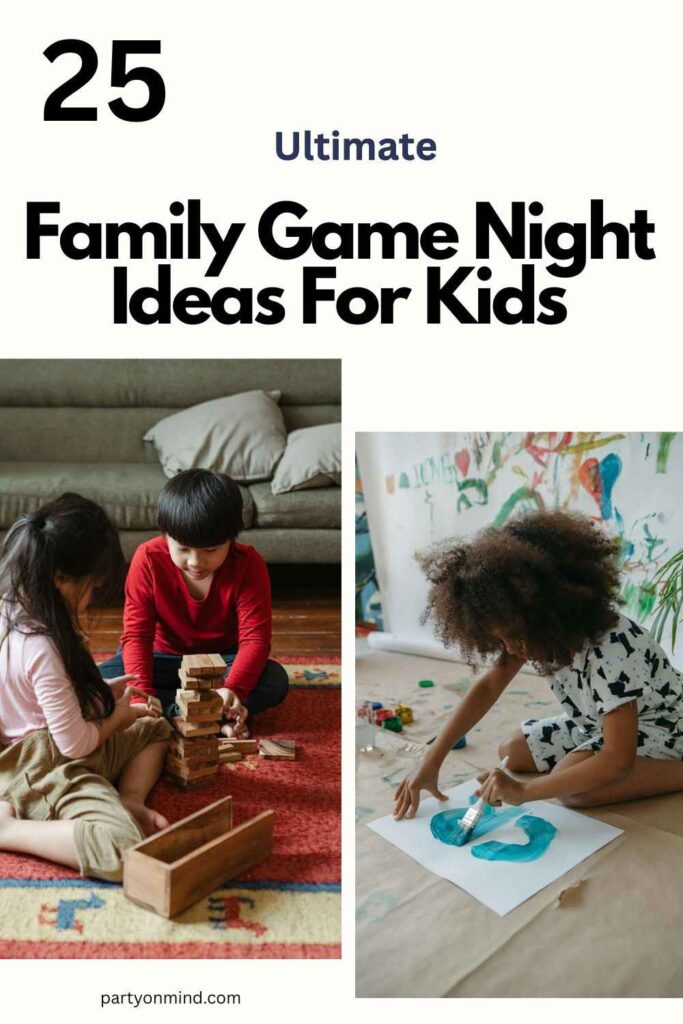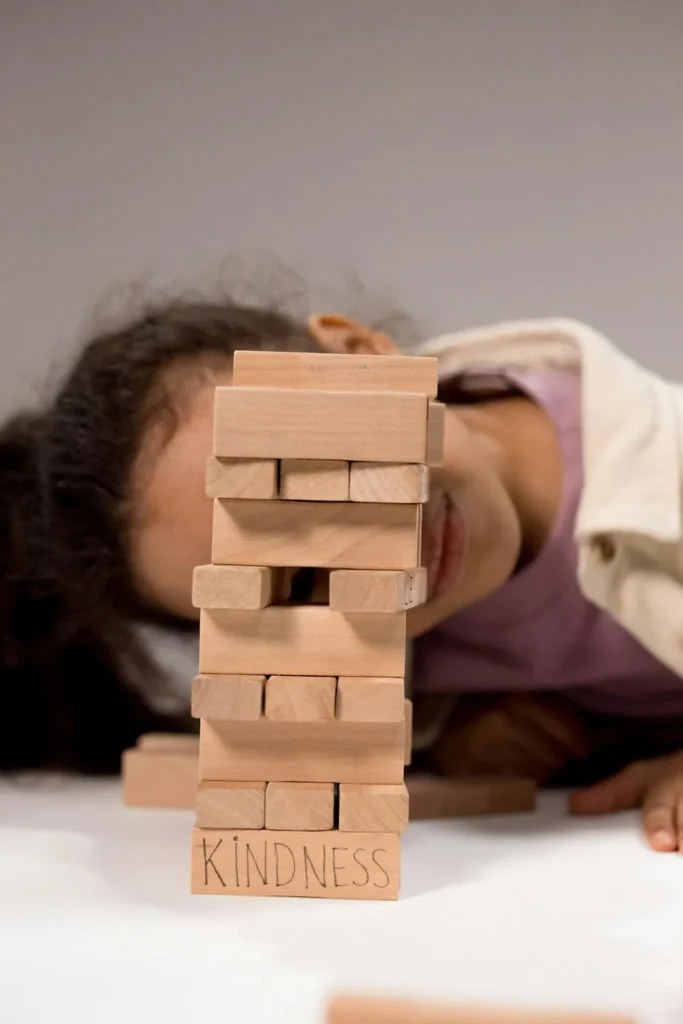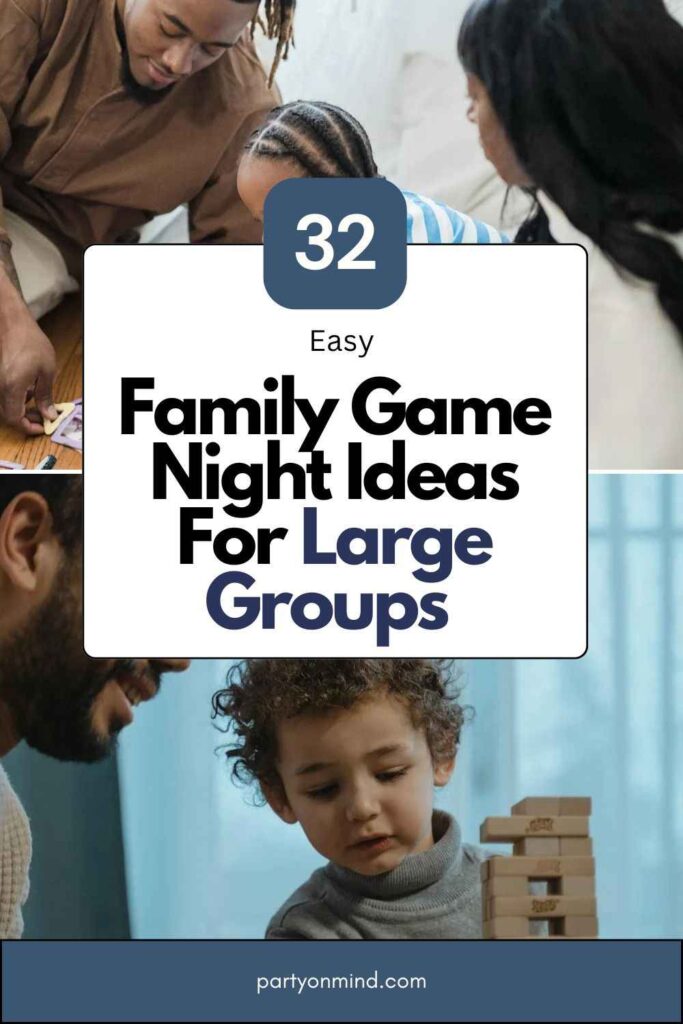Hi, I’m Emma, and I’m so excited to share some of my favorite Family Game Night Ideas For Kids! In a world filled with busy schedules and screen time, setting aside one night a week to play games together can make a huge difference. Family game nights are more than just fun—they’re a powerful way to strengthen relationships, create lasting memories, and help kids build important life skills.
Family Game Night Ideas For Kids
Looking for fun ways to connect as a family? These Family Game Night Ideas For Kids are perfect for bringing everyone together with laughter, teamwork, and memorable moments.
Charades
Charades is a classic, no-prep game that brings out laughter and creativity in both kids and adults. It involves acting out words or phrases without speaking, while others guess what it is. This is great for boosting kids’ imagination and communication skills. You can tailor it to any theme like animals, movies, or actions.
View this post on Instagram
- Create a list of kid-friendly prompts ahead of time
- Use a timer for extra excitement (30 seconds per turn)
- Divide into teams to encourage teamwork
- Encourage silly, over-the-top acting
- Celebrate each correct guess with claps or mini-rewards
Freeze Dance
Freeze Dance is perfect for high-energy fun and works for kids of all ages. It helps develop listening skills and self-control while letting kids dance and burn off energy. When the music stops, everyone must freeze in place. It’s simple, silly, and always entertaining.
- Choose upbeat, kid-friendly music
- Have someone control the music randomly
- Award points for funniest freeze pose
- Use themed music (holiday, animal songs, etc.)
- Make it a dance-off challenge for older kids
Scavenger Hunt
A scavenger hunt turns your home into an exciting adventure land. Kids follow clues or search for specific items, using their observation and problem-solving skills. This game keeps them moving and thinking, and it can be themed for holidays, birthdays, or just a random fun night.
- Create simple clues or use picture-based lists for younger kids
- Hide items in safe, reachable spots
- Make teams or let each child search individually
- Time the hunt for added excitement
- Offer a small prize at the end
Bingo
Bingo is a relaxing yet engaging game that kids love. You can use traditional number Bingo or create your own with themes like animals, foods, or family trivia. It promotes focus and number or word recognition depending on the version.
- Print or draw your own Bingo cards
- Use small treats or tokens as markers
- Include a fun prize for the winner
- Let kids take turns calling the numbers
- Try blackout Bingo for longer play
Pictionary
Pictionary brings out creativity and laughs as players draw clues for teammates to guess. It helps kids practice thinking visually and fosters quick thinking under time pressure. It’s ideal for artistic and non-artistic kids alike.
- Use a whiteboard, chalkboard, or paper
- Set a timer for each turn (e.g., 1 minute)
- Prepare a bowl of family-friendly prompts
- Team play works best for large families
- Give bonus points for funny or detailed drawings
Simon Says
Simon Says is a fantastic listening and coordination game that’s easy to play anywhere. Kids follow commands only if they begin with “Simon says” and get out if they move when they shouldn’t. It’s quick, fun, and teaches focus.
- Let everyone take turns being Simon
- Start with simple actions, then increase difficulty
- Mix in silly commands for laughs
- Play elimination rounds for a challenge
- Encourage funny voices or themes (pirate Simon!)
Balloon Pop
Balloon Pop is an energetic game that involves popping balloons to find hidden tasks or messages. It’s messy, loud, and a total hit with kids who love surprises. Great for birthdays and special family nights.
- Insert paper slips with tasks into balloons
- Blow up and scatter them around the room
- Let kids pop them by sitting or stomping
- Read the tasks out loud (sing a song, do 10 jumps)
- Supervise closely for safety
Uno
Uno is a colorful and strategic card game that’s easy to learn and endlessly replayable. It’s ideal for teaching kids about matching, colors, numbers, and a bit of strategy. It’s portable and works for small groups.
- Review rules together before playing
- Use a “house rules” version with fun twists
- Keep a quiet environment for focus
- Encourage good sportsmanship
- Try speed rounds for a challenge
Hot Potato
Hot Potato is a fast-paced game that keeps kids on their toes. Players pass an object around while music plays and try not to be holding it when the music stops. It builds quick reflexes and anticipation.
- Use a soft toy or ball as the “potato”
- Play upbeat music and pause it randomly
- Eliminate the last holder each round
- Have a silly dance-off for eliminated players
- Make it non-elimination for younger kids
Jenga
Jenga is a tension-filled game that helps improve kids’ fine motor skills and patience. Players take turns pulling out blocks from a tower without toppling it. It’s a quiet, thoughtful game full of suspense and strategy.
- Build the tower on a level surface
- Encourage steady hands and slow moves
- Add challenges (e.g., pull with your non-dominant hand)
- Play in teams for support
- Celebrate creative ways of removing blocks
Would You Rather
Would You Rather is a simple question game that sparks imagination and conversation. Players choose between two funny or tricky scenarios. It’s perfect for winding down the evening with laughter and debates.
- Use a jar of pre-written questions
- Take turns answering around the circle
- Let kids make up their own questions
- Ask follow-up “why” to encourage thinking
- Keep questions silly, age-appropriate, and light
Puzzle Race
Puzzle Race turns a quiet activity into a friendly competition. Kids (and adults) race to complete puzzles either individually or in teams. It boosts problem-solving, patience, and attention to detail.
- Choose age-appropriate puzzles (size and piece count)
- Set a timer or race without time for fun
- Use matching puzzles for fairness in teams
- Celebrate everyone’s finished work
- Offer a puzzle trophy or prize
Animal Charades
Animal Charades is a kid-friendly twist on traditional charades, focused entirely on acting out animals. Kids will roar, hop, and slither their way to hilarious fun. It’s perfect for younger children who love animals.
- Use animal cards or make your own
- Limit each round to 30 seconds
- No sounds allowed for added difficulty
- Let each kid choose their favorite animal
- Applaud creative interpretations
Cup Stack Challenge
Cup Stack Challenge is a fast-paced game where players race to stack and unstack plastic cups. It encourages hand-eye coordination, focus, and friendly competition. Great for short bursts of fun.
- Use colorful plastic cups
- Time each player or race head-to-head
- Set up mini tournaments with brackets
- Add fun rules (stack with one hand, eyes closed)
- Let kids cheer each other on
Family Trivia
Family Trivia is a personalized quiz game where questions are about your own family. It’s a fun way to recall memories, share stories, and learn about each other. Plus, it’s perfect for all ages.
- Prepare questions in advance (birthdays, vacations, funny moments)
- Use a whiteboard or buzzer system
- Play in teams or as individuals
- Offer fun prizes for correct answers
- Let kids contribute questions too
Game Night Tips for Parents
Family game nights can be one of the best ways to bond with your kids, but they’re even better when everyone feels included and excited. As a parent, setting the right tone can make the difference between a fun evening and a chaotic one. These tips will help ensure that your game night is enjoyable for everyone, from the youngest to the oldest.
-
Rotate who picks the game
Let each family member take a turn choosing the game. This adds variety and gives everyone a sense of ownership in the fun. It also helps kids learn about fairness and decision-making. -
Keep the competition friendly
Game nights should be about fun, not fierce competition. Encourage your kids to focus on having a good time, rather than winning at all costs. Remind them that everyone is a winner when you’re spending time together. -
Mix ages fairly
If you have kids of different ages, be sure to adapt the games so everyone can participate. For example, pair younger kids with older ones during team-based games, or adjust the rules to make it easier for younger players to keep up. -
Use a prize or reward system
Adding a little incentive can keep the energy up and make everyone feel like a winner. Small prizes like stickers, snacks, or little toys can be a fun reward after a game. Just remember that the goal is to celebrate everyone’s efforts, not just the winners.
These simple tips will help ensure your game night is full of laughter, learning, and quality family time!
FAQ
What are some age-appropriate Family Game Night Ideas For Kids?
For younger kids, games that are simple and visually engaging are best. Consider games like Candy Land, Memory, Freeze Dance, or Animal Charades. These games are easy to understand, encourage movement, and help improve memory and motor skills.
How do I make sure everyone feels included during family game night?
To make everyone feel included, rotate who picks the game, so everyone gets a chance to choose. Pair older kids with younger ones in team games, and adjust the rules if necessary to ensure everyone can participate at their level. Keeping competition friendly and focusing on fun will also help.
How do I handle if my kids start arguing during a game?
It’s natural for kids to get competitive, but it’s important to remind them that game night is about having fun, not winning. Encourage good sportsmanship, and if arguments arise, take a break and discuss what went wrong. Setting a rule for how to handle disagreements—like taking turns or being patient—can help prevent conflicts in the future.

I’m Emma Rosenthal, an event planner based in New York City with a passion for bringing people together through unforgettable celebrations. I created partyonmind.com to share my best party ideas, wedding inspirations, and fun games for kids, adults, and everyone in between. Whether you’re planning a small gathering or a grand event, I love helping you make every occasion special with creative and engaging activities. Let’s make every party one to remember!
![Fun Party Games Ideas for Kids, Adults [Party On Mind]](https://partyonmind.com/wp-content/uploads/2025/02/on-1-316x90.png)




